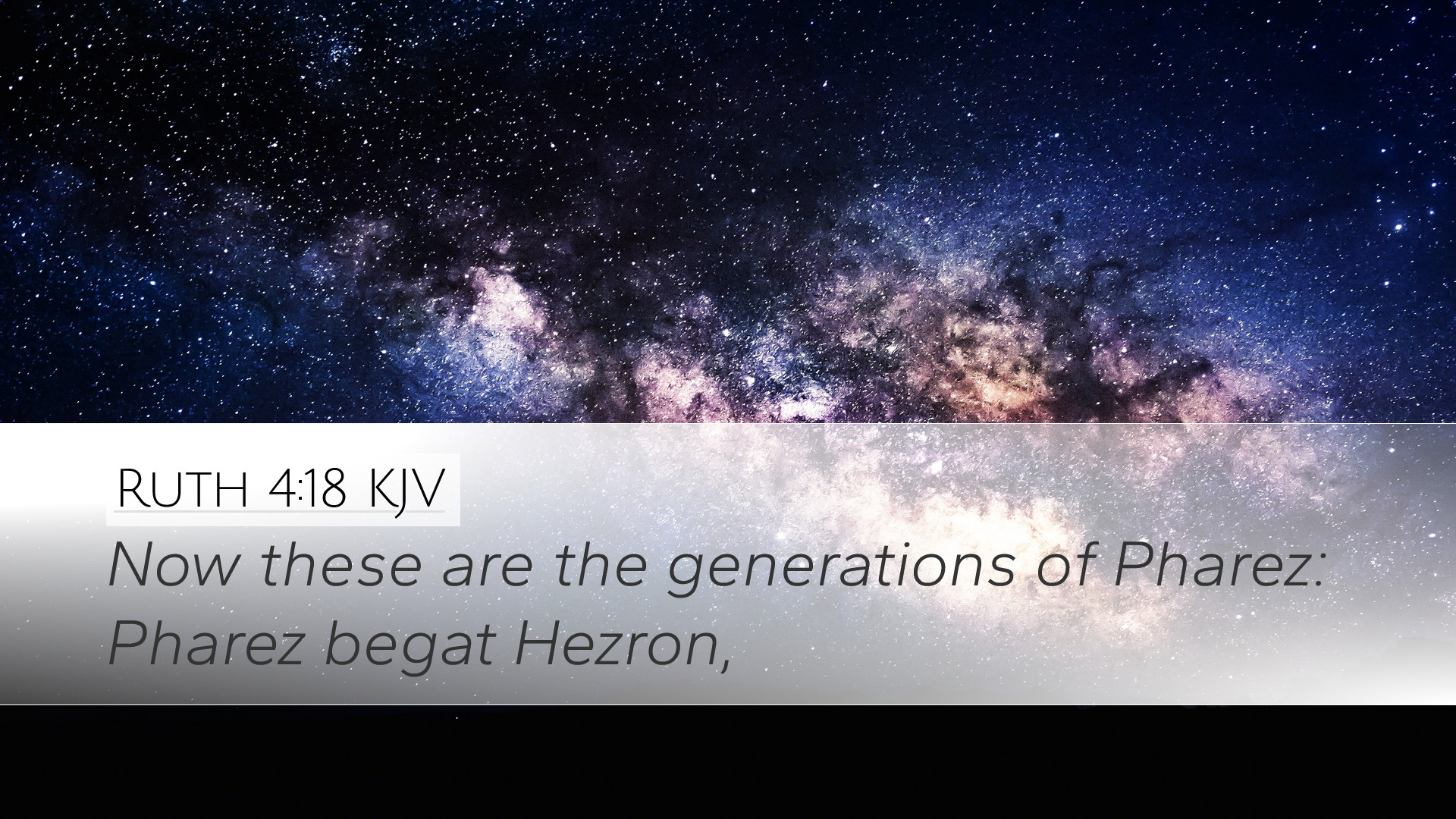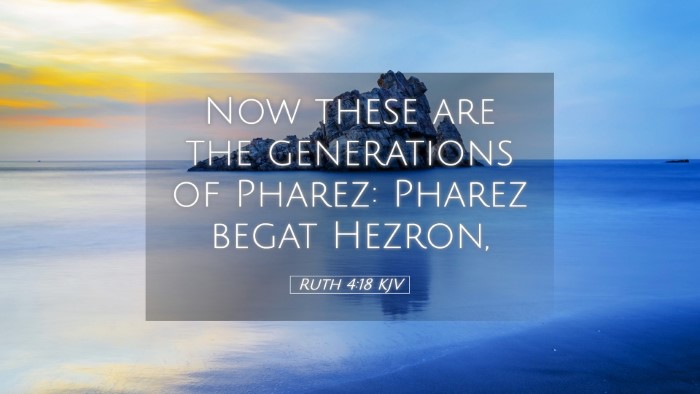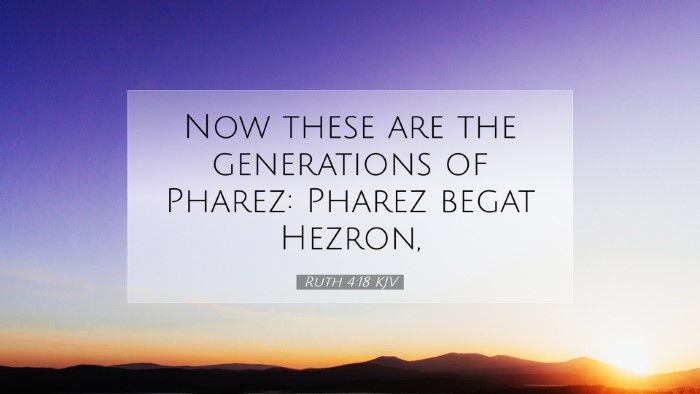Old Testament
Genesis Exodus Leviticus Numbers Deuteronomy Joshua Judges Ruth 1 Samuel 2 Samuel 1 Kings 2 Kings 1 Chronicles 2 Chronicles Ezra Nehemiah Esther Job Psalms Proverbs Ecclesiastes Song of Solomon Isaiah Jeremiah Lamentations Ezekiel Daniel Hosea Joel Amos Obadiah Jonah Micah Nahum Habakkuk Zephaniah Haggai Zechariah MalachiRuth 4:18
Ruth 4:18 KJV
Now these are the generations of Pharez: Pharez begat Hezron,
Ruth 4:18 Bible Commentary
Commentary on Ruth 4:18
Ruth 4:18 is a significant verse within the narrative of the Book of Ruth, encapsulating the genealogy of King David. This verse is foundational for understanding God's providential arrangement of Israel's history and the significance of Ruth's place within it.
Text of Ruth 4:18
"Now these are the generations of Pharez: Pharez begat Hezron."
Contextual Overview
The Book of Ruth, a part of the historical and wisdom literature of the Bible, is celebrated for its themes of loyalty, redemption, and divine providence. The narrative develops through the lives of Naomi and Ruth, leading to the final verses that reveal Ruth's integral role in the lineage of David, and ultimately, the Messiah.
Genealogical Significance
Matthew Henry emphasizes the importance of genealogy in the Scriptures. He points out that the genealogies serve not just as historical records but also as a testament to God's faithfulness and promise. In Ruth 4:18, we see the beginning of the Davidic line stemming from Pharez, the son of Judah, which speaks volumes about the Lord's providence in fulfilling His covenant with Abraham, Isaac, Jacob, and Judah.
God’s Covenant Fulfilled
Albert Barnes notes that the genealogy demonstrates how God orchestrated events throughout history to bring about the fulfillment of His promises. Pharez's line leads directly to David, showcasing God's intention in having a shepherd king emerge from a humble Moabite woman, Ruth.
Historical Context of Pharez
Pharez is an essential figure in the lineage of Israel, whose birth is historically situated during a time of significant transition for the family of Judah, as noted by Adam Clarke. The account of Pharez's birth is a reminder of God's grace; he was born out of an unfortunate circumstance involving Tamar, his father's son Judah. This illustrates the redemptive qualities of God’s plan markedly evident in Ruth's story as well.
Connection to Jesus Christ
The significance of this genealogy extends beyond David to Jesus Christ. Both Matthew's and Luke's genealogies of Jesus trace back to David, showing that the plan for redemption through Christ was rooted in the family line established in Ruth 4:18. The inclusion of a Moabite in this lineage also points to God’s grace, transcending ethnic boundaries, which resonates with the Great Commission's directive to reach all nations.
Lessons on Redemption
The narrative culminates in a redemptive act, reflected in Boaz's marriage to Ruth. Matthew Henry highlights the theme of redemption not only in a legal sense but also in a deeply relational one as Boaz redeems Ruth, a picture of Christ redeeming His bride, the Church.
The Role of Women in Genealogy
This verse, while focused on male lineage, invites a reflection on the role of women such as Ruth and Naomi. Their actions demonstrate loyalty and faithfulness, which leads to a legacy that impacts generations. Adam Clarke draws attention to the active participation of women in God’s plan, showcasing that God's narrative is inclusive, involving individuals from diverse backgrounds.
Theological Implications
From a theological perspective, the genealogy in Ruth 4:18 has profound implications. It reiterates that God is sovereign and utilizes every circumstance, whether tragic or triumphant, to work toward His divine purpose. The inclusion of Ruth emphasizes that God’s love and plan includes everyone, regardless of their past or ancestry.
Faith and Heritage
The heritage that Pharez establishes in this verse is an invitation to reflect on how faith is passed down through generations. Ruth, a foreigner, exhibits faith in the God of Israel and becomes an essential part of His redemptive history, prompting current believers to consider how their own faith stories intertwine with the broader tapestry of God’s purpose.
Application for Today
For pastors, students, theologians, and Bible scholars, Ruth 4:18 serves as a reminder of God’s providence, the importance of genealogy, and the call to inclusivity in God’s family. The narrative encourages reflection on personal heritage and the ways faithful living can influence future generations.
Encouragement in Trials
Moreover, Ruth's journey from widowhood to becoming the great-grandmother of a king should inspire believers facing their own trials. It highlights that God works through difficult situations to bring about His blessings, reinforcing the message that faithfulness in the small and challenging moments is honored by God in ways that may affect the lives of many.
Conclusion
In conclusion, Ruth 4:18 is more than a mere genealogy; it encapsulates themes of redemption, faith, and God's unwavering faithfulness across generations. The verse invites readers to consider their place within the grand narrative of Scripture, where God utilizes every individual and story to fulfill His sovereign plan for redemption through Christ.


